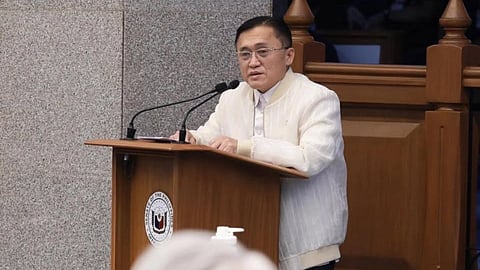Go pushes lower PhilHealth premiums under UHC law
Senator Christopher “Bong” Go is calling for the swift passage of Senate Bill No. 2620, which seeks to reduce PhilHealth premium contributions from 5 percent to 3.25 percent under the Universal Health Care (UHC) law.
“I hope the President approves the bill soon. I am one of its authors. We are pushing to reduce the premium contribution from 5 percent to 3.25 percent. Their funds are more than enough,” Go said. “For now, it is better to lower the rate than suspend contributions, especially since their fund is excessive.”
Speaking at the 3rd National Convention of the Department of Health Employees’ Association (NADEA) on 28 May, Go emphasized the financial burden many Filipinos face when accessing healthcare services.
Senate Bill 2620 has already passed on third reading and is among the priority legislation identified by the Legislative-Executive Development Advisory Council for passage before Congress adjourns.
While acknowledging PhilHealth’s vital role, Go raised concerns about its fund management and coverage. He recalled a case involving Dr. Walter Jalgalado, a health officer from Camarines Norte, who received only P57,000 in total PhilHealth coverage for hospital bills amounting to P10 million.
“He got sick and the bill was P4 million. PhilHealth paid P27,000. He got sick again and the bill was P6 million. PhilHealth paid P29,000. That is less than 1 percent of his total hospital bill,” Go said.
The senator reiterated his stance that PhilHealth must improve its services and accountability. “PhilHealth should not operate like a business. It is meant to serve the people. Return the people’s money to them. That is our contribution,” he added.
Go has also opposed the transfer of PhilHealth’s excess funds to the National Treasury, calling it “legally questionable and morally wrong.” He warned that doing so could limit the agency’s ability to provide essential health benefits.
Due to mounting public concern, PhilHealth recently implemented key reforms. These include scrapping the Single Period of Confinement and the 24-hour confinement requirement, expanding emergency outpatient coverage and removing the 45-day annual limit on hospitalizations. Case rates for common illnesses such as UTI, influenza and gastroenteritis have also been increased.
However, Go noted that awareness of these reforms remains low. “Out of 115 million Filipinos, only 27.8 million are registered for PhilHealth’s e-Konsulta program. That is less than 25 percent,” he said. “This shows PhilHealth’s information campaign is lacking.”
To address this, Go is pushing for Senate Bill No. 2983 or the Philippine Health Card Act of 2025, which aims to issue a durable ID or digital proof of PhilHealth membership.
“It is important for Filipinos to have proof that they are covered. Whether it is a physical card or a digital one, what matters is that they know they have something to rely on when they get sick,” he said.
Go also encouraged health workers to take part in shaping reforms, inviting them to join upcoming Senate hearings and submit proposals to improve healthcare access.


